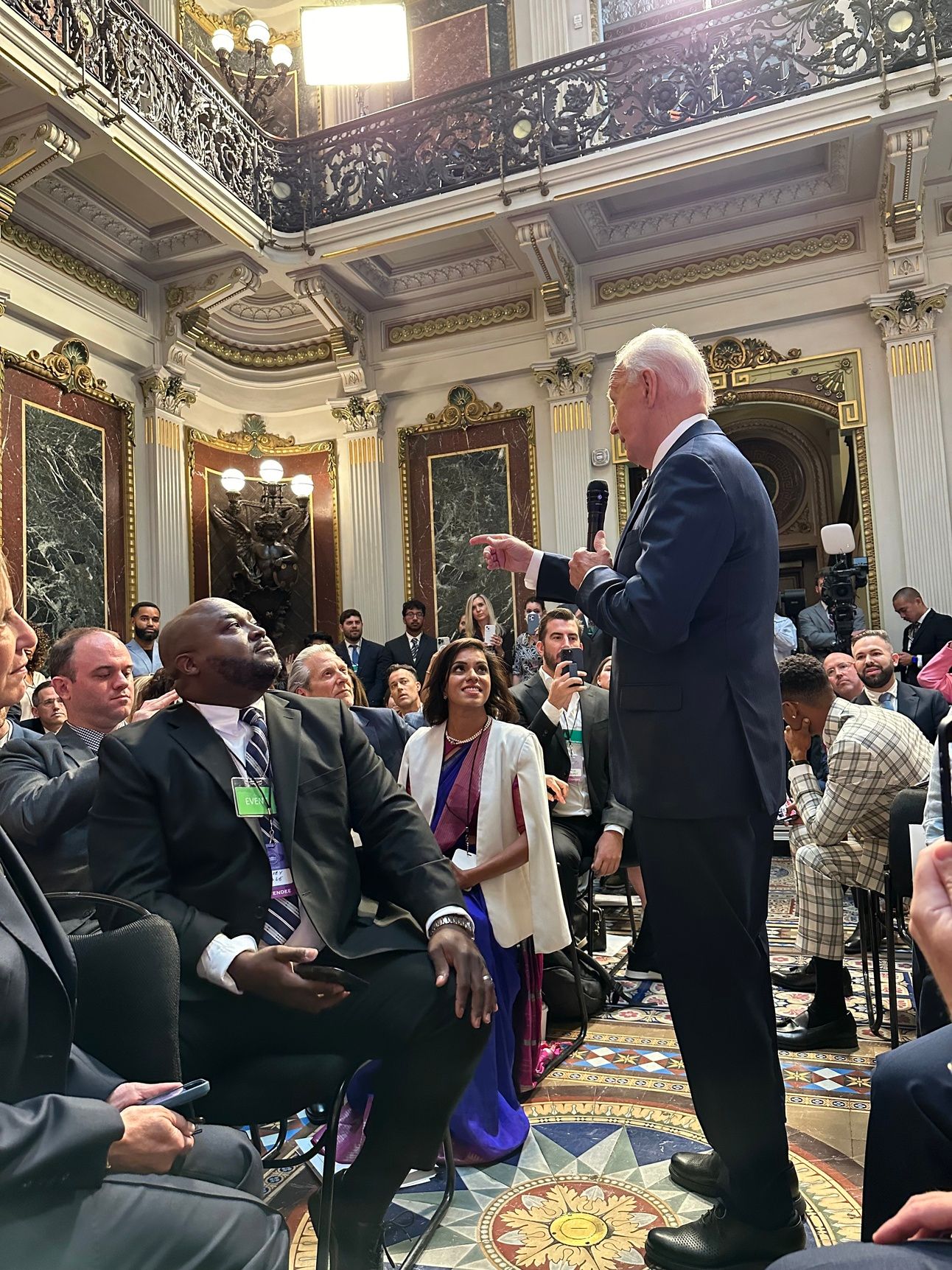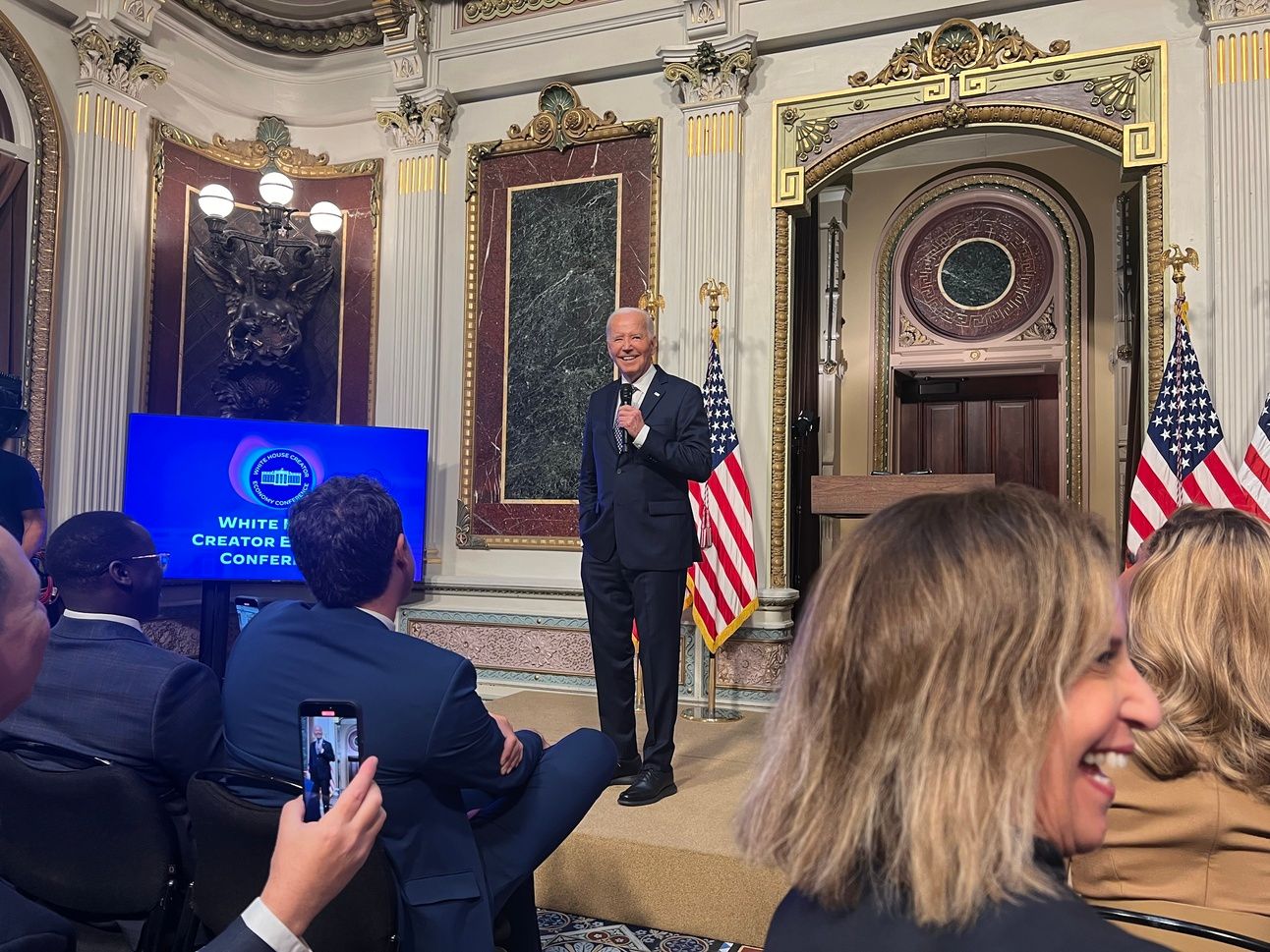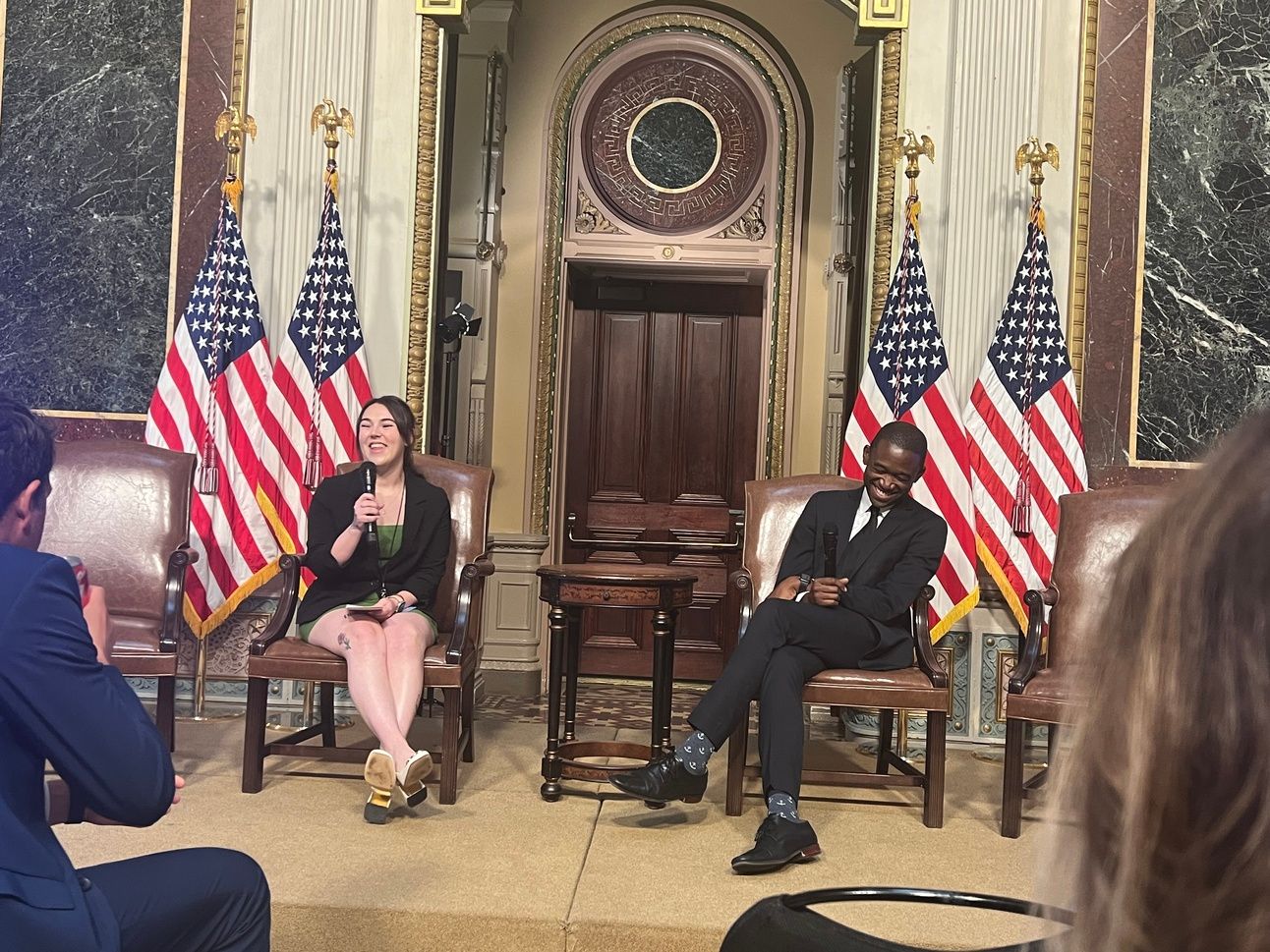
President Biden
This week, I attended the first-ever White House Creator Economy Conference (WHCEC), organized by the White House Office of Digital Strategy.
The Details

President Biden (and me!)
The event gathered over a hundred top creators and industry professionals, including influencers with millions of followers, executives from companies bridging creators and brands, talent managers negotiating deals, and independent marketers slash creators like me. The diverse mix of attendees spanned various backgrounds and sectors within the ecosystem.
Held in the beautiful Indian Treaty Room in the Eisenhower Executive Office Building, the day featured a series of fireside chats, panels, and breakout sessions. Key topics included mental health, AI, fair pay, and more, with discussions led by members of the administration and creators.
President Biden’s Surprise Visit and Endorsement

President Biden
President Joe Biden even dropped by. Initially scheduled for a brief five-minute visit, he stayed for over half an hour.
"You are the future…" he said, emphasizing the $250 billion value of the creator economy.
Biden acknowledged that younger generations increasingly turn to creators for news and entertainment, sharing, "I tell you what, I have a bunch of grandchildren, and, with all due respect, they don't read the same newspapers or watch the same television I do. They listen to all of you."
Creators Are Transforming Media and Influence

Karine Jean-Pierre and Patrick Stevenson
In recent years, we've seen a shift in power from traditional entities to individuals. While traditional press remains crucial, social media has opened doors for new media—creators and influencers—who leverage today's platforms to discuss topics they care about, directly reaching and building trust with their audiences.
"You're trusted. And it makes the difference," Biden shared.
White House Press Secretary Karine Jean-Pierre echoed this sentiment during her conversation with Patrick Stevenson, Senior Advisor for Digital Strategy. She noted the difference between creators and traditional media today—praising how creators build platforms that are uniquely theirs and reflect what they care about, whether in the moment or what's important to them. A big part of this is that they aren’t connected to organizations—like a writer is to a publication.
Creators have been penetrating more industries than ever. We've seen creators get their products on the same shelves at Walmart as the biggest CPG brands, have their videos streamed more than summer blockbusters, and become go-to sources for sports, news, and, of course, now politics.
While President Biden's appearance was the highlight for many attendees, including myself, the rest of the jam-packed day was also exciting. Here's a recap of the key themes discussed and some of my perspectives on these topics.
Being Online Has Downsides for Mental Well-Being

Neera Tanden, Joel Bervell, Lexi Hidalgo, and Kate Mackz
Mental health was a key topic discussed in the opening panel led by Neera Tanden, Domestic Policy Advisor to President Biden, with creators Joel Bervell, Lexi Hidalgo, and Kate Mackz. They talked about the mental health challenges that creators face, particularly the impact of negative comments. Hidalgo shared her past struggles, noting how comments from strangers affected her mental well-being. She and Mackz advocated for not allowing anonymity online, as it enables people to say things they would never say in person.
Bervell highlighted the disproportionate impact of online racial attacks on people of color and stressed the need for education on responsible social media use. He suggested dedicating time in classrooms to teach kids how to benefit from social media while protecting themselves from its darker aspects.
Tanden pointed to the bipartisan Kids Online Safety Act as a key solution, aiming to provide parents and young people with tools to safeguard their online well-being.

Terika Lambert and Jackie Aina
In a keynote conversation, Terika Lambert, Deputy Director of Digital Strategy, chatted with long-time makeup creator Jackie Aina, who offered her insights on mental health. She reflected on noticing that the COVID-19 pandemic brought significant changes to mental health for both creators and the general public.
My Take: Mental health isn't unique to the creator economy, but it's arguably one of the most pressing issues. As people build massive online audiences, they face both benefits and downsides, from cyberbullying and harassment to the pressure of solving followers' problems who look to them. With more young people living online, there's a growing need for laws and resources to support them in dealing with the challenges of social media.
As Bervell said, there should be a focus on helping people use social media responsibly. For something that plays a role in almost everyone's life, there's minimal effort in educating people about it beyond growing a following. But to me, there's no one-size-fits-all solution—a combination of efforts from parents, education systems, and lawmakers is needed to combat it.
As a new father and someone who has benefited from the power of social media, I think a lot about how my wife and I will handle social media when our daughter is of age, so I'll stay close to this for the foreseeable future.
Access to Benefits & Capital Can Level the Playing Field for Creators

Hannah Williams and Wally Adeyemo
Hannah Williams of Salary Transparent Street sat down with Wally Adeyemo, Deputy Secretary of the Treasury, on the financial challenges creators face. Whether they're trying to transition to becoming full-time creators or simply managing their businesses, many struggle with things like expensive health insurance and the inability to secure capital for life milestones like purchasing a home or car due to not having a W-2.
Adeyemo highlighted steps the government has taken to assist, such as making health insurance more affordable and investing in community banks that are more likely to provide loans to local entrepreneurs. Initiatives like the State Small Business Credit Initiative and the IRS Free File service were mentioned.
My Take: Having left a 9-to-5 job less than two months ago to go solo, this topic resonates deeply with me. I had to consider many of these factors in making this jump. The inability to access health insurance or secure funding can be a roadblock to pursuing one’s dreams, which is being a creator for many today.
Support that helps creators overcome these hurdles is crucial, not only for their success but also for economic growth. Creators are having a significant impact on economic progress. For the country to continue benefiting this subset of workers, creators need access to similar benefits as traditional employees and require government support to obtain resources from corporations and institutions, akin to the support available for small businesses.
AI Is a Double-Edged Sword for Creators

Gohar Klan and Dr. Arati Prabhakar
A fireside chat between YouTuber Gohar Khan and Dr. Arati Prabhakar, Director of the Office of Science and Technology Policy, focused on the role of AI in the creator economy. Khan shared his experience using AI for video scripts, noting that it often fails to capture his unique essence. However, his bigger concern was a deepfake video in which his likeness was used to sell a TikTok Shop product—a situation he described as "a little scary."
AI was a major topic during the breakout sessions. While Khan focused on some negative implications of AI, another creator provided a different perspective, highlighting how the emergence of AI tools has helped his business.
Prabhakar highlighted the White House's broader focus on AI, pointing to the Executive Order on Safe, Secure, and Truthworthy Artificial Intelligence. When it came to the creator economy specifically, she mentioned the need to balance the benefits of AI—such as helping people do more and learn more—with the potential disruption, it can cause in the workforce, including the careers of content creators.
My Take: We’re in the early days of AI, but the technology is advancing rapidly. Due to AI's broader implications, it’s challenging for policymakers to keep pace with its development. Establishing appropriate regulations will take time. Among the most positive impacts the government can have on AI and creators is preventing the unauthorized use of their content and likeness, not only by big tech but also by malicious actors. Additionally, ensuring that creators are rewarded and compensated when their work contributes to large AI models is crucial.
A Seat at the Table for Creators

Christian L. Tom
Christian L. Tom, Director of Digital Strategy, and Marian Dimaano, Director of Partnerships, who opened up the day, closed it out as well. Tom made an interesting comparison of the creator economy and how it is creating a paradigm shift similar to what 19th-century railroads did.
While the Biden Administration approaches its final months, hopefully, this doesn’t mean that the direct connection between the White House and the creator economy diminishes. Creators are playing a significant role in the upcoming presidential campaigns, but it’s important that their role isn’t just to amplify policies and agendas. They should also have a voice in shaping them and have a seat at the table.
The creator economy has come so far, and while creators can achieve a lot on their own, they need support. What better support could there be than from the highest levels of power—the federal government? For the White House to plan a day of programming and for the President himself to stop by is an incredible validation of this industry's power and influence and its potential to hold even more influence in the future.
If you have any questions about the experience or want to learn more, reply to this email, or send me a DM. I’ll also share more photos and videos from the event on my Instagram and Threads.
I hope to see you at the next WHCEC!
If you’re getting value from this newsletter, let me know — Buy Me A Coffee.
